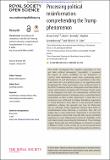Processing political misinformation: comprehending the Trump phenomenon
Author(s)
Lewandowsky, Stephan; Ecker, Ullrich K. H.; Swire-Thompson, Briony; Berinsky, Adam
DownloadProcessing political.pdf (1.047Mb)
PUBLISHER_CC
Publisher with Creative Commons License
Creative Commons Attribution
Terms of use
Metadata
Show full item recordAbstract
his study investigated the cognitive processing of true and false political information. Specifically, it examined the impact of source credibility on the assessment of veracity when information comes from a polarizing source (Experiment 1), and effectiveness of explanations when they come from one's own political party or an opposition party (Experiment 2). These experiments were conducted prior to the 2016 Presidential election. Participants rated their belief in factual and incorrect statements that President Trump made on the campaign trail; facts were subsequently affirmed and misinformation retracted. Participants then re-rated their belief immediately or after a delay. Experiment 1 found that (i) if information was attributed to Trump, Republican supporters of Trump believed it more than if it was presented without attribution, whereas the opposite was true for Democrats and (ii) although Trump supporters reduced their belief in misinformation items following a correction, they did not change their voting preferences. Experiment 2 revealed that the explanation's source had relatively little impact, and belief updating was more influenced by perceived credibility of the individual initially purporting the information. These findings suggest that people use political figures as a heuristic to guide evaluation of what is true or false, yet do not necessarily insist on veracity as a prerequisite for supporting political candidates.
Date issued
2017-02Department
Massachusetts Institute of Technology. Department of Political ScienceJournal
Royal Society Open Science
Publisher
Royal Society
Citation
Swire, Briony; Berinsky, Adam J.; Lewandowsky, Stephan and Ecker, Ullrich K. H. “Processing Political Misinformation: Comprehending the Trump Phenomenon.” Royal Society Open Science 4, no. 3 (March 2017): 160802 © 2017 The Authors
Version: Final published version
ISSN
2054-5703